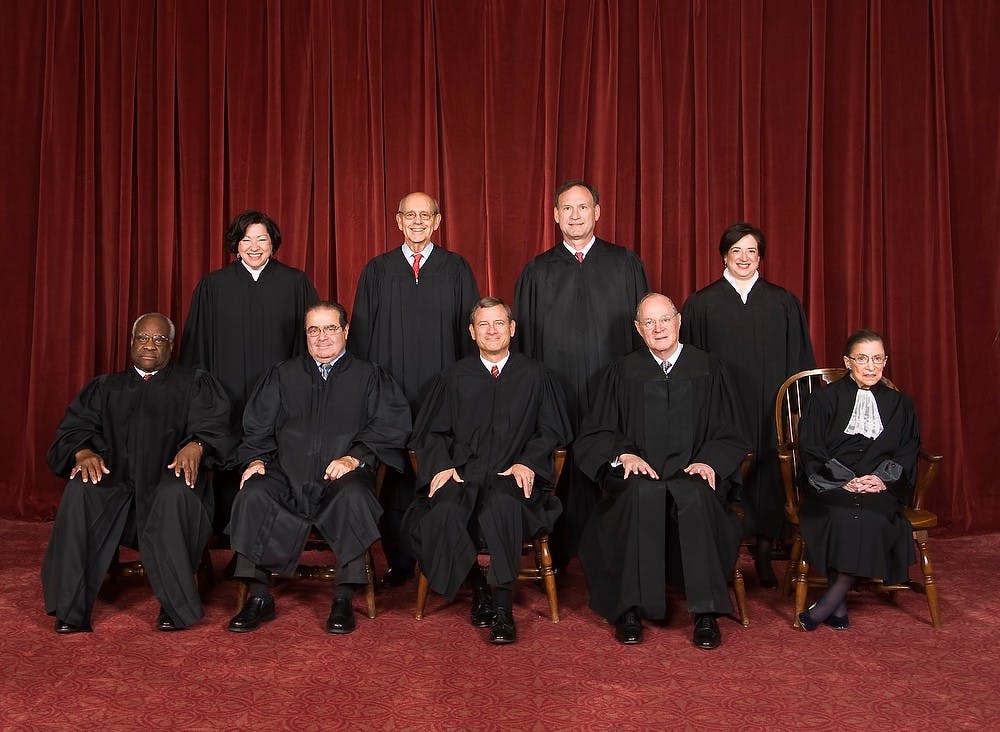WASHINGTON — MSU will take center stage in the polarized national debate over race-inclusive admissions Tuesday when the U.S. Supreme Court hears arguments regarding Michigan’s ban on affirmative action policies in university admissions.
Michigan Attorney General Bill Schuette is challenging a lower court’s decision to overturn a statewide ban on affirmative action, which was approved by voters in 2006. Affirmative action advocates will present evidence that race-inclusive policies are effective ways to achieve a diverse student body.
Both MSU and the University of Michigan are named in the case because of their proximity to the issue. MSU officials acknowledge there has been a drop in minority enrollment since the ban took effect, although they have been reluctant to come out publicly in favor of race-inclusive policies.
Another pillar of the case surrounds constitutionally-protected participation in the political process. Pro-affirmative action advocates argue the ban marginalizes minority groups by making it harder for them to challenge university policy. For virtually all other adminissions changes, citizens are allowed to petition the university directly.
Legal experts say the outcome likely will be another landmark precedent in the affirmative action battle.
In 2011, the U.S. Court of Appeals for the Sixth Circuit declared the ban unconstitutional on the grounds that it restructured the state’s political process and placed burdens on underrepresented minorities.
Schuette challenged the federal court’s ruling, and the Supreme Court agreed to review the case. A decision might not be made until spring 2014, but experts already are speculating on the outcome.
“One of two things is going to happen,” said Philip Pucillo, a legal scholar and lecturer at MSU. “If the provision is constitutional, things go back to the way they were in Michigan before the Court of Appeals ruling that made it unconstitutional … The other possibility is the Supreme Court decides the provision is unconstitutional.”
If it’s the latter, Michigan colleges and universities could consider race in the admissions process, just like every other higher educational institution in the country, Pucillo said.
Back on campus
Since Proposal 2 passed seven years ago, MSU’s enrollment for black freshmen dropped by roughly 17 percent, according to university data. A report from the American Civil Liberties Union showed overall enrollment at Michigan universities grew by 10 percent during those same years.
Most universities in the state have acknowledged a “chilling effect” on minority enrollment after the 2006 ban, said Paulette Granberry Russell, senior advisor to the president for diversity and director of the Office for Inclusion and Intercultural Initiatives at MSU. Granberry Russell said state universities have seen declines in minority enrollment, especially MSU and U-M.
The university is limited to using race-neutral alternatives in trying to create a diverse student body, unless the Supreme Court upholds the U.S. Court of Appeals decision.
To create diversity on campus, university officials have to use barometers such as geographic location — in the form of heavy recruiting from an area like Detroit — or using socioeconomic status. That way, the university still can work towards its goals, Granberry Russell said.
Granberry Russell said there’s not enough evidence to confirm whether race-neutral admissions alternatives are as effective as simply using affirmative action.
A brief submitted by U-M and MSU addressed similar concerns. Among other issues, the brief asks the court to disregard the state’s argument for race-neutral policies.
Schuette’s brief argues race-neutral alternatives are just as effective, and using race as even one factor among many in the admissions process is discrimination.
The university has not publicly taken a stance on the use of affirmative action, but maintains inclusion as one of its core values.
Students speak up
Some students, including Black Student Alliance President Tyler Clifford, believe the decline in black student enrollment is directly related to the ban on affirmative action. Clifford said the black population at Michigan universities will continue to decline if poorly-performing, inner-city high schools aren’t a focus in university recruitment efforts.
Support student media!
Please consider donating to The State News and help fund the future of journalism.
“America preaches it was founded on equality,” Clifford said. “This is not reality.”
Clifford said until universities can maintain the same level of diversity using only race-neutral alternatives, affirmative action still is necessary.
But other students feel differently. MSU College Republicans said they don’t support the idea of affirmative action, firmly standing with Schuette, said Will Staal, the group’s president.
Tracking affirmative action:
Keep checking The State News for more coverage.
Discussion
Share and discuss “Affirmative action up for debate” on social media.







